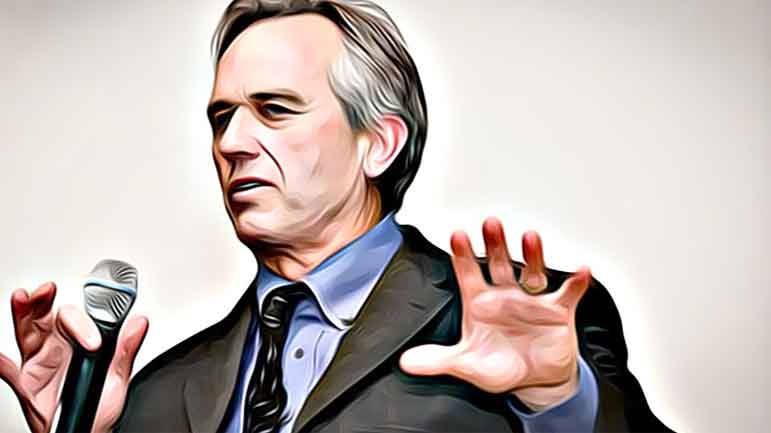
There are many intriguing mansions in the great house of MAGA but perhaps the most intriguing of all has its own name: MAHA or Make America Healthy Again. America undeniably suffers from a serious health crisis: Almost half of Americans have high blood pressure, three-quarters are obese or overweight, and 15% have type 2 diabetes. Previous attempts to improve these figures have been frustrated, despite the liberal application of the world's best brains. Can America's eccentric new health and human services secretary succeed where so many of his sensible predecessors have failed?
There are obvious reasons for doubt. Donald Trump's pick for the job is, to put it mildly, an oddball: a scion of the Kennedy dynasty, a reformed heroin addict and womanizer, a devotee of odd diets such as raw milk, and a manchild given to strange practical jokes such as dumping a dead bear cub in
He is a vaccine skeptic who has repeatedly claimed that vaccines are linked to autism, a claim for which there is no generally accepted evidence. This might be regarded as a disqualification for even an entry-level job at the
Kennedy repeatedly insisted in his confirmation hearings that he is not a vaccine denier and that his skepticism is focused on mercury. He promised to enforce good practice. But his first few weeks in office have been disappointingly lethargic, in contrast to the focused energy coming from the
The forces of inertia are vast. These begin with the organization of
The special interests also have an unbroken record of resisting reform. Food and soft drink companies have stymied attempts to improve Americans' diets with a ruthlessness that would impress the
Yet Kennedy's very eccentricity may prove to be a great asset given the failure of his sensible predecessors. Taking on the status quo is the leitmotif of Kennedy's life. He is also right about one big thing: America's best chance of improving health care lies in tackling chronic diseases such as heart-disease and hypertension, both of which are linked to poor diet and exercise. HHS has tended to focus on high-level research because that is where status in the medical profession lies. But the big gains lie in improving America's diet and lifestyle rather than churning out more research papers.
Kennedy also has something that none of his predecessors has had: a movement. For centrists, health-care reform has been a matter of experts telling the people what to do, a model that was tested to destruction by
The combination of institutional and movement power gives RFK two ways to achieve his aims. He can use his responsibility for food safety to crack down on the chemicals that companies nonchalantly add to food. (Visiting Europeans are often surprised by how brightly colored
For too long good health has been associated with liberal do-goodery and top-down expertise — and Red America has seen Big Macs and Big Gulps as weapons against digestive elitism rather than as threats to their cardiovascular systems. The MAHA movement is relinking good health to a bottom-up tradition of self-help — a tradition that has thrown up a long line of benevolent cranks such as the Kellogg brothers, who started the eponymous cereal companies, and that currently flourishes on the internet.
It is also scrambling the battle lines in American politics. Sanders is one of the most enthusiastic supporters of preventing people from using food stamps to purchase soda even though such purchases represent significant revenue for
With the MAGA Right and the Crunchy Left on RFK's side, the most stubborn resistance to MAHA is coming from the center, particularly from the credentialed class that loathes Trump and dominates the healthcare complex. More than 15,000 doctors signed an open letter lobbying against his confirmation by the
RFK is right to focus on chronic diseases, where America's health lags far behind that of other advanced countries. He faces a war of attrition with malign forces, particularly Big Food and Big Soda, that have blocked so many sensible reforms in the past, and that are doing everything they can to influence the president. It is time for centrist Americans to hold their noses and join MAHA's fight against chronic disease.
Adrian Wooldridge is the global business columnist for Bloomberg Opinion. He was previously a writer at the Economist. His latest book is "The Aristocracy of Talent: How Meritocracy Made the Modern World."
Previously:
• 11/27/23: If you want more globalization, build better walls
• 09/06/23: CEOs must soldier on even as AI anxieties loom
• 08/31/23: The incredible shrinking global sea powers
• 06/20/23: If neoliberalism did not exist, we would have to invent it
• 05/02/23: Disruption will always be capitalism's secret sauce
• 05/02/23: What science says about the coronation of Charles III
• 01/04/23: Who are the nepo babies among us?
• 07/13/22: Boris Johnson's fall is populism's latest act of self-destruction
• 06/21/22: The West is facing a followership crisis
• 05/25/22: The 1970s had a big bright side, too
• 05/10/22: Young Americans aren't as woke as you think
• 05/04/22: The furor facing Disney in Florida is a warning that capitalism won't regain its legitimacy by alienating
(COMMENT, BELOW)


 Contact The Editor
Contact The Editor
 Articles By This Author
Articles By This Author